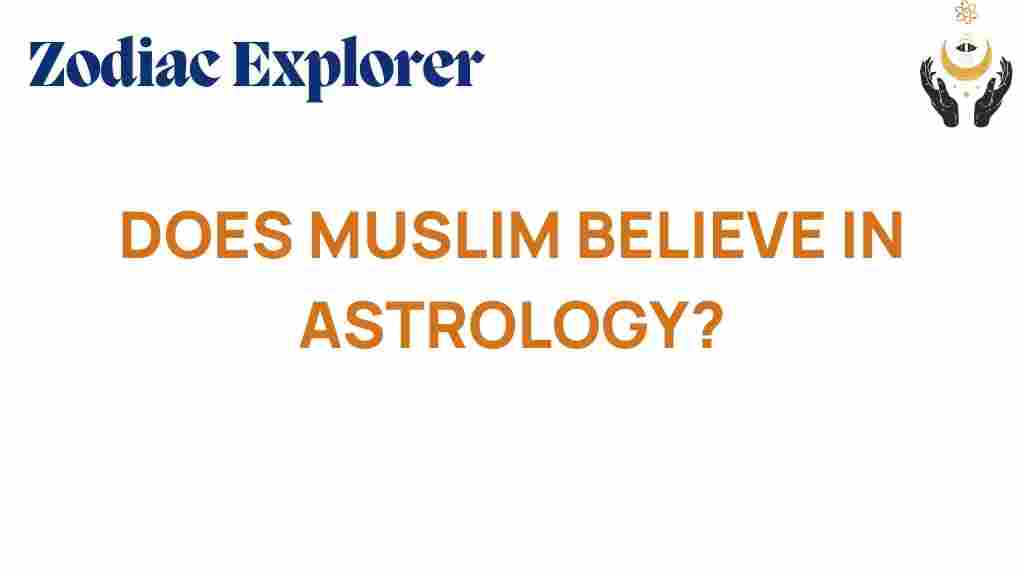Exploring the Intersection of Islam and Astrology: Do Muslims Believe?
The relationship between Islam and astrology is a complex and often debated topic. For many, astrology represents a fascinating blend of spirituality and cultural perspectives, while for others, it raises questions about faith and religion. In this article, we will explore the beliefs surrounding astrology within the context of Islam, examining how various interpretations affect Muslim views on destiny, the zodiac, and spirituality. We will also touch on the historical significance of astrology in Islamic culture and address common misconceptions.
Understanding Astrology in a Religious Context
Astrology is the study of celestial bodies and their influence on human affairs and natural phenomena. It has deep roots in various cultures, often intertwined with spiritual beliefs. In the Islamic context, astrology’s acceptance varies widely among different scholars and communities.
- Historical Background: Many Muslim scholars in the early centuries, particularly during the Golden Age of Islam, engaged with astrology. They translated Greek texts and contributed to astrological knowledge.
- Contemporary Views: Today, opinions on astrology among Muslims can range from acceptance to outright rejection, influenced by cultural backgrounds and religious teachings.
Islamic Beliefs and Practices
Islam is a monotheistic religion founded on the belief in one God (Allah) and the teachings of the Prophet Muhammad. Central to Islamic faith are the Five Pillars, which guide the spiritual lives of Muslims. Astrology, however, does not form part of these foundational beliefs. In fact, many Islamic scholars warn against the practice of astrology, arguing that it can lead to shirk (associating partners with Allah), which is a serious sin in Islam.
The Role of Fate and Free Will in Islam
One of the core tenets of Islamic belief is the concept of fate (Qadar). Muslims believe that Allah has predetermined the course of events in the universe, and everything happens according to His will. This raises intriguing questions about how astrology fits into the understanding of fate and free will:
- Predestination: If everything is preordained by Allah, how can astrological interpretations, which suggest that celestial bodies influence events, coexist with this belief?
- Guidance vs. Destiny: Some argue that while astrology may provide insights, it should not dictate one’s actions or beliefs, as faith in Allah remains paramount.
Cultural Perspectives on Astrology
Across different Muslim cultures, astrology is viewed through various lenses:
- Acceptance in Some Communities: In certain cultural contexts, like South Asia or the Middle East, astrology is widely accepted, and horoscopes may be consulted for guidance.
- Rejection by Others: Conversely, many Muslims reject astrology outright, viewing it as incompatible with Islamic teachings.
The Interpretations of Astrology within Islam
Astrology is subject to various interpretations based on religious and cultural contexts. Let’s delve into different perspectives:
1. Traditional Islamic Scholars’ Views
Many traditional Islamic scholars argue that astrology contradicts Islamic teachings. They emphasize:
- Reliance on Allah’s guidance through prayer and the Quran rather than celestial influences.
- Warnings against the dangers of divination, which is frequently mentioned in Islamic texts.
2. Modern Interpretations
Conversely, some contemporary Muslims adopt a more flexible approach:
- They may see astrology as a tool for self-reflection rather than a definitive guide.
- Some practitioners argue that astrology can coexist with Islamic beliefs, provided it is viewed as a form of psychological insight.
3. The Role of the Zodiac
The zodiac, which divides the year into twelve signs, plays a significant role in astrology. Each sign is believed to have particular traits and influences. In Islamic culture, the zodiac can be understood as:
- A source of cultural identity for some communities.
- A topic of fascination and discussion, albeit approached with caution.
Common Misconceptions about Astrology and Islam
Understanding the nuances of astrology’s place in Islam requires dispelling some common misconceptions:
Myth vs. Reality
- Myth: All Muslims believe in astrology as a guiding force.
- Reality: Beliefs about astrology vary significantly among Muslims, influenced by cultural and personal factors.
- Myth: Astrology is explicitly forbidden in Islam.
- Reality: While many scholars condemn astrology, others argue for a more nuanced understanding of its role.
Step-by-Step Understanding of Astrology in Islam
To better grasp the relationship between astrology and Islamic beliefs, consider the following steps:
- Study the Quran: Engage with Islamic texts to understand the foundational beliefs that guide Muslim spirituality.
- Explore Cultural Practices: Investigate how astrology is practiced in various Muslim cultures to gain insights into its acceptance.
- Consult Scholars: Seek perspectives from knowledgeable Islamic scholars who can provide clarity on contentious issues regarding astrology.
- Reflect on Personal Beliefs: Consider your own views on spirituality and how they align or conflict with astrological beliefs.
If you find yourself struggling to reconcile astrology with your Islamic beliefs, here are some tips:
- Engage in Dialogue: Talk with fellow Muslims about their views on astrology to gain a broader perspective.
- Seek Knowledge: Read books and articles from both proponents and critics of astrology within the Islamic context.
- Prayer and Reflection: Use prayer as a means to seek guidance and clarity on your beliefs.
Conclusion: Finding Balance in Beliefs
The intersection of Islam and astrology presents a rich tapestry of beliefs and cultural interpretations. While astrology is often viewed with skepticism in many Islamic circles, some Muslims find value in its insights and narratives. It is crucial to navigate this complex relationship with an open mind and a firm grounding in one’s faith.
Ultimately, whether one embraces or rejects astrology, the key is to maintain a strong connection with Allah and prioritize spiritual growth. Understanding different perspectives can lead to a more comprehensive view of spirituality and the diverse beliefs that shape our understanding of fate, the zodiac, and our paths in life.
For further reading on the cultural significance of astrology, you can check out this external resource. If you’re interested in learning more about Islamic teachings, visit this internal link for detailed insights.
This article is in the category Myths and created by ZodiacExplorer Team
